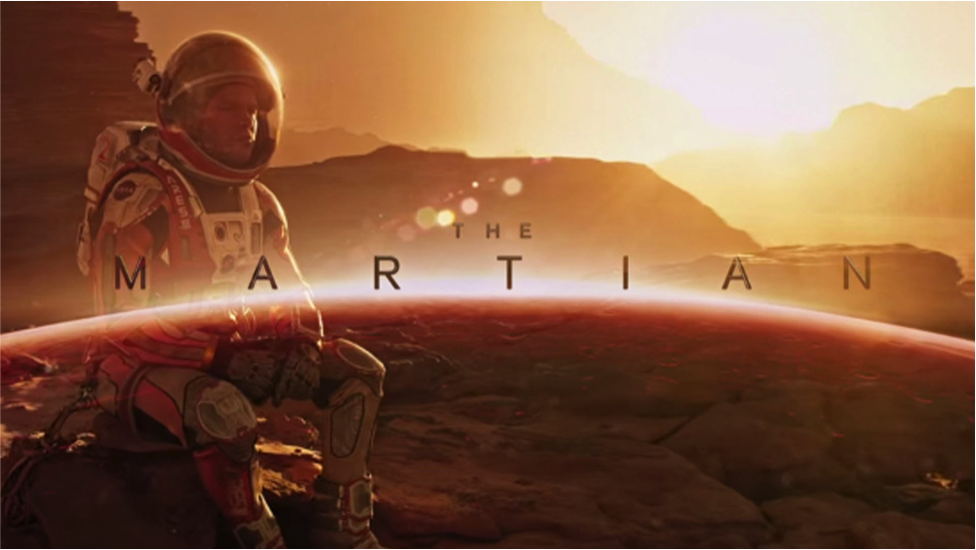By Jeptha McNair
Ridley Scott has made plenty of solid-to-great films in his career, from “Blade Runner” and “Alien” to “Gladiator” and “Hannibal,” and while he’s earned a reputation as a strong director within Hollywood, his films come across as bleak. After a string of critical and commercial flops like “Robin Hood,” “The Counselor,” and “Exodus: Gods and Kings,” all of which fit the dour vibes of the rest of his resume, it was time for a change of pace, lest audiences start to give up on him. Without question, he rose to the challenge with “The Martian”.
“The Martian” is based on the book of the same name by Andy Weir, and stars Matt Damon as astronaut Mark Watney. He is part of a crew of astronauts that lands on Mars during the Ares III mission of 2035. After a major storm seemingly kills Watney, the rest of the team decides to escape the storm, leaving Mars, and Watney, behind. The next morning, after the dust settles, Mark Watney wakes up in the Martian dirt badly injured but still alive. He realizes he has enough resources for a small crew of people and decides to survive as long as possible, in hopes of finding a way off the planet that he alone inhabits. Back on Earth, NASA, having already told the world that Watney was killed in the mission to Mars, starts to see movement on the red planet, and knows Watney is behind it. He figures he can make it back when the Ares IV mission lands on another part of Mars in four years – if only he can be there when it arrives.
The movie immediately brings to mind two other recent big budget science fiction movies, “Gravity” and “Interstellar,” and indeed it shares striking similarities with both. All three movies involve an astronaut stranded out in space, and the one in “Interstellar” is even played by Matt Damon, with Jessica Chastain being among the team of people trying to save him. All three movies are reasonably committed to staying as scientifically accurate as possible without sacrificing story. Many moviegoers believed this movie would be more of the same. “Gravity” and “Interstellar” chose to use the harrowing vastness of space to convey serious points about our purpose. While the setting and general storyline is similar to those films, the loose, confident, and more humorous tone of “The Martian” sets it apart – so much so that Mark Watney’s hilarious one liners in his personal video diary earned the film a nomination for Best Picture- Musical or Comedy at the Golden Globes (which it won, by the way).
That is a credit to screenwriter Drew Goddard, who adapted Andy Weir’s book without sacrificing any of its charm. The script is so upbeat in its view of humanity that the movie actually depicts everybody back on Earth, and I mean everybody, working so hard to try to bring Watney back. The movie strongly depicts the human ability to survive by sheer willpower and brilliant resourcefulness. Matt Damon loses himself in the role of Watney, earning an Oscar nomination for his performance despite the film’s fairly obvious resistance to giving him anything that resembles a stereotypical “Oscar moment,” such as a major panic scene or temper tantrum. The movie was supposedly filmed in Jordan and Hungary, but it might as well have been filmed on Mars – a true credit to the visual effects and production design crew. The rest of the cast is solid as well, from Jeff Daniels as the NASA director to Chiwetel Ejiofor as the mission director and Jessica Chastain as the mission commander, but nobody overshadows Matt Damon. The scenes on Earth instead function as a true ensemble.
I don’t mean to suggest that the movie is perfect by any means. Ridley Scott has suggested that he will release an extended cut, but I suggest that he not do that. The film has several moments of dead time that could have been cut, and by the thrilling climax, I felt the length of the movie weighing on it a bit. For an otherwise family-friendly movie, the language felt out of place. And despite how well the story was told, this ultimately is a simple and predictable story that we’ve heard before.
“The Martian” isn’t going to win Best Picture, in part because it refused to be the type of movie that the Oscars celebrate. Well, except for the fact that it feels like a true story. Regardless, the movie hopefully will be remembered as a turning point in Ridley Scott’s career, when he took another bleak story and this time turned it into a blast.
